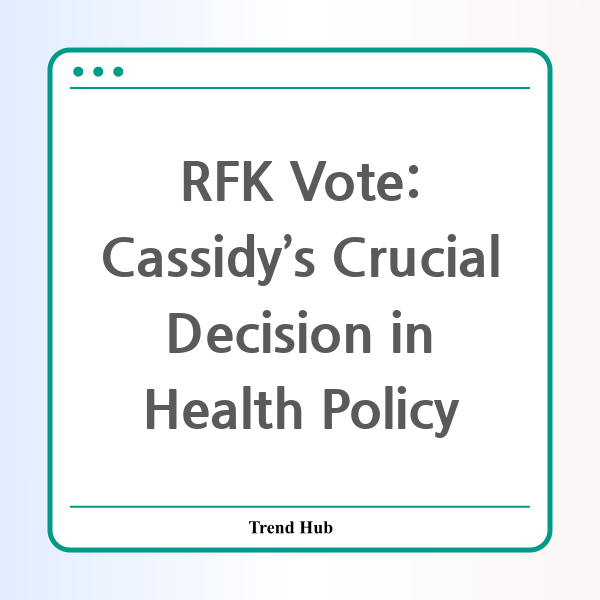* This website participates in the Amazon Affiliate Program and earns from qualifying purchases.

As Robert F. Kennedy Jr. seeks to become America’s top health official, the spotlight turns on Louisiana Republican Senator Bill Cassidy. His upcoming vote could signify a pivotal moment in U.S. health policy and reveal Cassidy’s political maneuvering amid growing tensions within the Republican Party.
Senator Cassidy, a trained physician, is grappling with the implications of Kennedy's appointment to lead the Department of Health and Human Services (HHS). His role becomes increasingly significant as he serves on the Senate Finance panel, set to cast a crucial vote on Kennedy’s nomination. The expected vote will not only influence Kennedy's chances but also serve as a litmus test for Cassidy's political future, especially after previous conflicts with former President Trump.
During recent confirmation hearings, Cassidy expressed deep concerns regarding Kennedy’s history of undermining public trust in vaccinations. Cassidy, reflecting on traumatic experiences in his medical career, emphasized the potential risks associated with appointing someone who has cast doubt on vaccine efficacy. He shared haunting memories of treating patients affected by preventable diseases, advocating for the imperative of maintaining public confidence in health practices and protocols.
Despite these apprehensions, Cassidy revealed a nuanced perspective. Acknowledging Kennedy's agenda to address chronic disease, Cassidy's responses hinted at a complicated position. While he criticized Kennedy’s past assertions, he also recognized the political realities of his own re-election bid amidst pressure from key Republican figures in Louisiana who support Kennedy’s nomination.
Political experts are closely monitoring Cassidy’s decision-making process. With Cassidy already facing challenges in his re-election campaign, especially due to a revamped primary system favoring party loyalty, his potential support for Kennedy could alienate some constituents while pleasing others. His relationships with various stakeholders—including healthcare advocates, political consultants, and his own party leaders—will play a critical role in his final vote.
The contrasting views within the party complicate Cassidy’s position. While some local political figures and Republican leaders push for Kennedy's swift confirmation, fearing that inaction could be politically detrimental, a noticeable faction, including many healthcare professionals, strongly opposes Kennedy’s nomination. This division further amplifies the stakes for Cassidy, uniquely positioning him as a key player who must reconcile these differing interests.
As the Senate Finance Committee prepares for its vote, Cassidy’s reflections on Kennedy’s qualifications and his own medical expertise are under scrutiny. The outcome of this decision reaches beyond the Senate floor; it potentially reshapes the conversation about healthcare policies, vaccinations, and trust in health leadership across the nation. In a time of significant flux, Cassidy's choice will echo through the corridors of power, impacting public health and political dynamics alike.
As we await the voting results, one question remains at the forefront: Will Cassidy prioritize the scientific evidence and public health concerns over partisan pressures, or will he lean into the prevailing political winds to secure his position?
* This website participates in the Amazon Affiliate Program and earns from qualifying purchases.